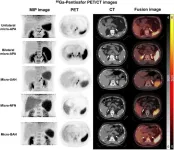(Press-News.org)
MEDIA INQUIRES
WRITTEN BY
Laura Muntean
Paul Schattenberg
laura.muntean@ag.tamu.edu
paschattenberg@ag.tamu.edu
601-248-1891
210-859-5752
FOR IMMEDIATE RELEASE
Texas A&M AgriLife Research study may lead to novel obesity treatment
New study provides insights on role of ‘hunger hormone’ receptor in obesity-realted chronic inflammation
A team comprised primarily of Texas A&M AgriLife Research scientists has made an important discovery that could lead to a novel treatment for obesity and obesity-associated diseases or conditions.
Details of the discovery can be found in the study “Nutrient-sensing growth hormone secretagogue receptor in macrophage programming and meta-inflammation,” published in the January issue of Molecular Metabolism.
Yuxiang Sun, Ph.D., is the lead investigator on a study that could lead to a novel treatment for obesity and obesity-associated diseases or conditions. (Texas A&M AgriLife photo by Michael Miller)
“Chronic inflammation commonly associated with obesity is a key reason obese individuals often have many other chronic diseases,” said Yuxiang Sun, Ph.D., professor and AgriLife Research Faculty Fellow in the Texas A&M College of Agriculture and Life Sciences Department of Nutrition and associate member of the Texas A&M Institute for Advancing Health Through Agriculture, IHA.
Sun, who served as lead investigator for the study, was among several investigators from the Department of Nutrition. Study contributions were also made by other entities in The Texas A&M University System.
Competitive funding for the study came from the National Institutes of Health. It was also supported by the IHA — the world’s first research institute to bring together precision nutrition, responsive agriculture and behavioral research to reduce diet-related chronic diseases.
About the study
The study focused on the role of one molecule involved in how our bodies deal with hunger: the growth hormone secretagogue receptor, GHSR, which mediates the effect of ghrelin, known as the “hunger hormone.” Studies have shown that ghrelin promotes eating and increases fat. Ghrelin activates GHSR to increase appetite, fat accumulation and insulin resistance.
Research has shown that under normal conditions, GHSR is highly active in the brain but much less active in other tissues such as liver and fat, also referred to as adipose tissue. For this reason, most ghrelin research has focused on the brain.
“Intriguingly, in previous research, we found the complete removal of GHSR protects against diet-induced inflammation and insulin resistance in adipose tissue and the liver without affecting food intake,” Sun said. “This was very puzzling because that GHSR has very low expression in fat and liver cells.”
A link between obesity and the immune system
Sun and her team has made the novel observation that GHSR activity in macrophages — a major immune cell type in tissues — increases dramatically under the condition of obesity. In this study, Sun’s team investigated whether ghrelin’s effect in adipose tissues and the liver was due to the infiltration of GHSR-expressing macrophages into these tissues under the condition of obesity.
“If that was the case, this infiltration by those particular GHSR-expressing macrophages would trigger chronic inflammation and insulin resistance,” Sun said.
Study results and implications
To understand the role of GHSR in macrophages, the team developed a unique animal model to selectively shut down GHSR activity in macrophages.
“Indeed, our study results showed that macrophage-specific GHSR deficiency reduces diet-induced systemic inflammation and insulin resistance,” Sun said. “Remarkably, GHSR deficiency in macrophages reduced diet-induced macrophage infiltration, macrophage activation and fat deposition in adipose tissue and the liver.”
In addition to their effect on diet-induced chronic inflammation, the study also demonstrated that GHSR-deficient macrophages protect against acute inflammation induced by bacterial toxins.
At a molecular level, they found GHSR programs macrophages through an insulin signaling pathway, Sun said. Basically, this study showed that macrophage GHSR controls chronic inflammation in obesity by regulating macrophage programming.
She said the study’s novel results demonstrate that macrophage GHSR plays a key role in meta-inflammation by promoting macrophage infiltration and inflammatory activation.
“These exciting new findings helped to resolve a long-time mystery of GHSR in adipose tissue and the liver in obesity, by uncovering the novel immunoregulatory role of GHSR and revealing that GHSR signaling is a critical link between metabolism and immunity,” Sun said.
She said the study adds a new dimension to the biology of ghrelin, and underscores that ghrelin is not only a hunger hormone, but also an important nutrient-sensor and immune regulator.
“This has profound implications for health and disease, as blocking GHSR in macrophages may serve as a promising immune therapy to prevent or treat obesity, diabetes and inflammation,” Sun said.
-30-
Would you like more information from Texas A&M AgriLife?
Visit AgriLife Today, the news hub for Texas A&M AgriLife, which brings together a college and four state agencies focused on agriculture and life sciences within The Texas A&M University System, or sign up for our Texas A&M AgriLife E-Newsletter.
For more resources including photo repository, logo downloads and style guidelines, please visit the Resources for Press and Media.
END
Texas A&M AgriLife Research study may lead to novel obesity treatment
New study provides insights on role of ‘hunger hormone’ receptor in obesity-realted chronic inflammation
2024-01-18
ELSE PRESS RELEASES FROM THIS DATE:
Semen microbiome health may impact male fertility
2024-01-18
You may have heard about the gut microbiome and its influence on a person’s overall health and well-being. It turns out that the same may hold true for the semen microbiome.
According to researchers from the Department of Urology at UCLA, the semen microbiota might play a crucial role in influencing sperm parameters and enhancing male fertility. Considering recent studies highlighting the microbiome’s significance in overall human health, researchers investigated the semen microbiome to understand its potential impact on male infertility. Exploring the functions of these microorganisms in semen could potentially pave the way for developing treatments targeted ...
South Florida’s nearshore reefs less vulnerable to ocean acidification, study finds
2024-01-18
South Florida’s Nearshore Reefs Less Vulnerable to Ocean Acidification, Study Finds
Results offer a glimmer of hope as climate change impacts coral reefs worldwide
Researchers studying South Florida’s coral reefs found that the region’s nearshore reefs and more sheltered inshore areas are less vulnerable to ocean acidification than previously thought – a major climate-related threat to coral reefs as ocean waters absorb more atmospheric CO2 from the burning of fossil fuels.
This new study, led by scientists at the University of Miami Rosenstiel School of Marine, Atmospheric, ...
Three University of Houston projects included in $17M+ funding for decarbonization and emissions research
2024-01-18
HOUSTON, January 18, 2024 – The U.S. Department of Energy (DOE) recently announced $17.4 million funding for 19 early-stage research projects focused on expanding clean energy technologies at colleges and universities across America. These projects will establish visiting scholars’ programs, create new academic curricula related to geosciences, and provide interdisciplinary training in humanities-driven science, technology, engineering, and mathematics fields.
The list includes three projects from the University of Houston, a Carnegie-designated Tier One Research University. Two of these explore the feasibility and benefit of repurposing ...
Knowing what dogs like to watch could help veterinarians assess their vision
2024-01-18
Ever wonder what kind of TV shows your dog might choose if they could work the remote control? New research from the University of Wisconsin–Madison’s School of Veterinary Medicine provides some answers, but the study was more interested in solving a longstanding problem in veterinary medicine than turning canine companions into couch potatoes.
According to Freya Mowat, veterinary ophthalmologist and professor in the School of Veterinary Medicine’s department of surgical sciences, researchers wanted to determine factors, including age and vision, that influence a dog’s ...
Household income and health insurance among factors in decision to withdraw life support after hemorrhagic stroke
2024-01-18
Living in a high-income neighborhood, having private health insurance, and being older are tied to an increased likelihood that life support will be withdrawn for people who have suffered severe bleeding in the brain, a new study shows.
Led by researchers at NYU Grossman School of Medicine, the study focused on the social and economic factors linked to the withdrawal of life support and related death after being hospitalized for intracerebral hemorrhages. Such bleeds, sometimes referred to as hemorrhagic stroke, often lead to swelling in the brain, which can put a patient into a coma and frequently ...
Xue lab at the CDI publishes groundbreaking insights into memory T cells in Nature Immunology
2024-01-18
The Xue Lab at the Hackensack Meridian Center for Discovery and Innovation (CDI) has made another breakthrough in better understanding, and potentially modulating, the immune system to fight diseases.
The insights into a specific protein and how it regulates the training and efficacy of central memory T cells are published by Hai-Hui (Howard) Xue, a member of the CDI, in the journal Nature Immunology.
The immunological implications could produce better vaccines and cancer treatments in the future, according to the Xue lab, which is also part of the Institute for Immunologic ...
Don’t look back: The aftermath of a distressing event is more memorable than the lead-up, study suggests
2024-01-18
Halfway through a true crime podcast, a morning commuter jerks the wheel to narrowly avoid a collision. When discussing the podcast with a coworker later that day, the driver can easily recall the details of the episode’s second half but retains only a blurry recollection of how it began.
A new study from psychologists at the Beckman Institute for Advanced Science and Technology suggests that we remember the moments immediately following a distressing episode more sharply than the moments leading up to it. Clarifying the relationship ...
FIFA World Cup ends with win for Argentina and COVID-19, new research finds
2024-01-18
TORONTO, Jan. 18, 2024 – The 2022 FIFA World Cup ended with a tight win for Argentina over France on penalties, but it was also a triumph for SARS-CoV-2 with a significant jump in the number of cases, some of which York University researchers say could have been prevented.
New research published today and led by York used the 2022 FIFA World Cup as a case study to help determine the best ways to mitigate virus spread and hospitalizations at mass gatherings in the future. A technique was used ...
New PET/CT technique accurately diagnoses adrenal gland disorder, informs personalized treatment plans
2024-01-18
Reston, VA—A novel imaging approach, 68Ga-pentixafor PET/CT, has been shown to accurately identify sub-types of primary aldosteronism (an adrenal gland disorder), outperforming traditional methods for diagnosis. Reported in the January issue of The Journal of Nuclear Medicine, this detailed imaging technique provides a clearer picture of the adrenal glands, helping doctors decide more confidently whether surgery is the right option for patients.
Primary aldosteronism is an endocrine disorder that occurs when the adrenal glands produce too much of the hormone aldosterone, frequently ...
A window into plant evolution: The unusual genetic journey of lycophytes
2024-01-18
An international team of researchers has uncovered a remarkable genetic phenomenon in lycophytes, which are similar to ferns and among the oldest land plants. Their study, recently published in the journal PNAS, reveals that these plants have maintained a consistent genetic structure for over 350 million years, a significant deviation from the norm in plant genetics.
"The exceptionally slow pace of genomic evolution sets these plants apart," said Dr. Fay-Wei Li, a professor at the Boyce Thompson Institute and a senior author of the study. ...
LAST 30 PRESS RELEASES:
Increasing the number of coronary interventions in patients with acute myocardial infarction does not appear to reduce death rates
Tackling uplift resistance in tall infrastructures sustainably
Novel wireless origami-inspired smart cushioning device for safer logistics
Hidden genetic mismatch, which triples the risk of a life-threatening immune attack after cord blood transplantation
Physical function is a crucial predictor of survival after heart failure
Striking genomic architecture discovered in embryonic reproductive cells before they start developing into sperm and eggs
Screening improves early detection of colorectal cancer
New data on spontaneous coronary artery dissection (SCAD) – a common cause of heart attacks in younger women
How root growth is stimulated by nitrate: Researchers decipher signalling chain
Scientists reveal our best- and worst-case scenarios for a warming Antarctica
Cleaner fish show intelligence typical of mammals
AABNet and partners launch landmark guide on the conservation of African livestock genetic resources and sustainable breeding strategies
Produce hydrogen and oxygen simultaneously from a single atom! Achieve carbon neutrality with an 'All-in-one' single-atom water electrolysis catalyst
Sleep loss linked to higher atrial fibrillation risk in working-age adults
Visible light-driven deracemization of α-aryl ketones synergistically catalyzed by thiophenols and chiral phosphoric acid
Most AI bots lack basic safety disclosures, study finds
How competitive gaming on discord fosters social connections
CU Anschutz School of Medicine receives best ranking in NIH funding in 20 years
Mayo Clinic opens patient information office in Cayman Islands
Phonon lasers unlock ultrabroadband acoustic frequency combs
Babies with an increased likelihood of autism may struggle to settle into deep, restorative sleep, according to a new study from the University of East Anglia.
National Reactor Innovation Center opens Molten Salt Thermophysical Examination Capability at INL
International Progressive MS Alliance awards €6.9 million to three studies researching therapies to address common symptoms of progressive MS
Can your soil’s color predict its health?
Biochar nanomaterials could transform medicine, energy, and climate solutions
Turning waste into power: scientists convert discarded phone batteries and industrial lignin into high-performance sodium battery materials
PhD student maps mysterious upper atmosphere of Uranus for the first time
Idaho National Laboratory to accelerate nuclear energy deployment with NVIDIA AI through the Genesis Mission
Blood test could help guide treatment decisions in germ cell tumors
New ‘scimitar-crested’ Spinosaurus species discovered in the central Sahara
[Press-News.org] Texas A&M AgriLife Research study may lead to novel obesity treatmentNew study provides insights on role of ‘hunger hormone’ receptor in obesity-realted chronic inflammation






